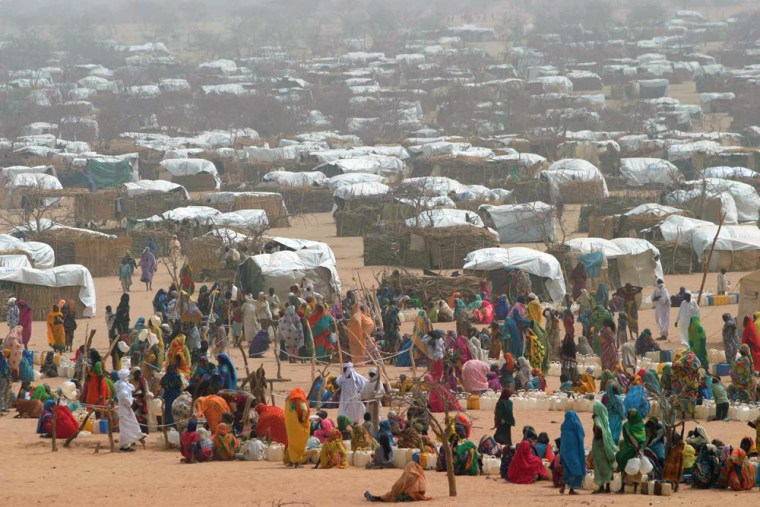As Secretary of State Colin Powell headed Tuesday to Sudan, international aid agencies were hoping that the high-profile visit to the crisis-ravaged nation will draw attention to the humanitarian disaster that has developed in the Darfur region there.
"That is certainly a really good opportunity," said Helen Palmer, media officer for the Oxfam relief organization. "Public response is important, but the countries need to step up and come through with funding."
With bureaucratic restrictions hampering both aid organizations and journalists alike, and obvious distractions on the news front like the war in Iraq, non-governmental organizations have been a hamstrung in terms of raising the public awareness of the crisis as well as the much-needed funds to help the refugees.
The United Nations estimates that more than 1 million people have been forced to flee their homes to escape attack by the maurauding Arab militia known as the Janjaweed. The militia launched a revolt more than a year ago with the apparent aim of displacing the black Sudanese tribes in Darfur.
"If nothing changes we will have 1 million casualties. If things improve we can get it down to about 300,000 deaths," Andrew Natsios, head of the U.S. Agency for International Aid (USAID), told Reuters during a stopover in Turkey en route to Sudan. "Because a lot of the kids are already so malnourished, you just cannot bring them back," he said.
Powell, along with U.N. Secretary General Kofi Annan, is expected to pressure the Sudanese government to loosen the restrictions on access to the region and to demand that the government stop supporting the Janjaweed, an accusation the government denies.
According to reports from the region, the militia has launched a wave of terror, including widespread murder and rape, that has forced a mass exodus of Sudanese. Some have headed to other towns in the Darfur region or all the way in neighboring Chad, where there are an estimated 100,000 living in makeshift refugee camps.
With access to the Darfur region limited, it has been difficult to quantify the full gravity of the crisis. But, new information gleaned from NASA photos clearly show the destruction of nearly 400 villages, Natsios said last week.
"We've now analyzed 576 villages, 300 of which are completely destroyed, 76 of which are substantially destroyed," Natsios said. "When we checked them on the ground, we confirmed what we found. We are going to watch them, using aerial photography for the duration to track what's happening."
Access limited
Over the past few months, aid workers have repeatedly complained about a lack of access to the Darfur region and how that has stymied their effort to convey the magnitude of the crisis to the general public.
Lynn Heinisch, the press officer for CARE in Africa recently spent two weeks in Sudan, one week in Khartoum and one week in Darfur. She described the difficulties for both aid workers and journalists in gaining access to the region.
Any aid worker or journalist must first gain a visa for entry to the Sudan, a feat in itself, and then another visa is required for travel to the Texas-sized Darfur region. Once access is gained, there are further travel restrictions and road stops at every turn demanding specific travel papers issued by the government. Heinisch described the plight of two journalists who were stuck waiting in Khartoum for at least two weeks waiting to get a visa to Darfur.
Many journalists have resorted to covering the story from Chad. But, for the aid agencies, the lack of journalists covering the story directly affects their ability to raise awareness about the crisis.
“Certainly when there is a lot of media coverage — people respond very quickly & generously — particularly Americans,” Heinisch said.
For Gordan Weiss, the UNICEF communications director for countries in crisis, the problem boils down to a scarcity of independent witnesses.
“It’s hard to convey the magnitude of the problem — that relies on the will of governments- ultimately we are up against the will of the government,” Weiss said.
‘Bottom rung of conscience level’
The crisis in Sudan has also not been grabbing news headlines for a variety of reasons — the war in Iraq and the myopic nature of news hasn’t helped much.
“Iraq is obviously a constant distraction,” said Weiss.
According to Heinisch, many of the journalists who previously covered Africa have been diverted to cover the wars in Iraq and Afghanistan. And there remains the age-old problem of getting Africa into the headlines of the Western media.
“We’re dealing with a ladder of consciousness, and Africa sits at the lower rung,” Weiss said.
That lack of interest hits the bottom line for many aid agencies.
The United Nations' plea for $350 million from member states has fallen short, with only a third of the money raised so far.
According to the U.N.'s latest donor information, the United States and United Kingdom have been at the forefront in terms of donor countries, contributing $89 million and $52 million respectively. But, others nations have not been as generous, for example France and Japan have contributed just $3 million, and Saudi Arabia $204,000.
“We are at point now that the media momentum has started to pick up, but funding hasn’t picked up yet, " said Oxfam's Helen Palmer.
But, for members of the international aid community, a visit by an American dignitary of Powell’s caliber certainly demonstrates the United States commitment to the crisis in Sudan and offers some hope.
Both Powell and Annan’s visits to the Sudan “will make a tremendous difference in terms of raising the awareness of the American people,” said Mike Kiernan, spokesperson for Save the Children U.S.A.
“The average American is just becoming aware of the enormity of this catastrophe,” said Kiernan. “Once they understand the enormity of the crisis, they will be very generous in responding.”
